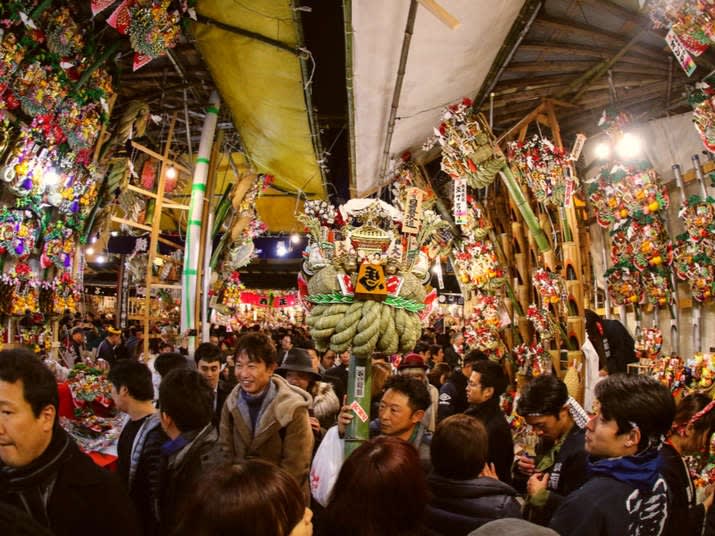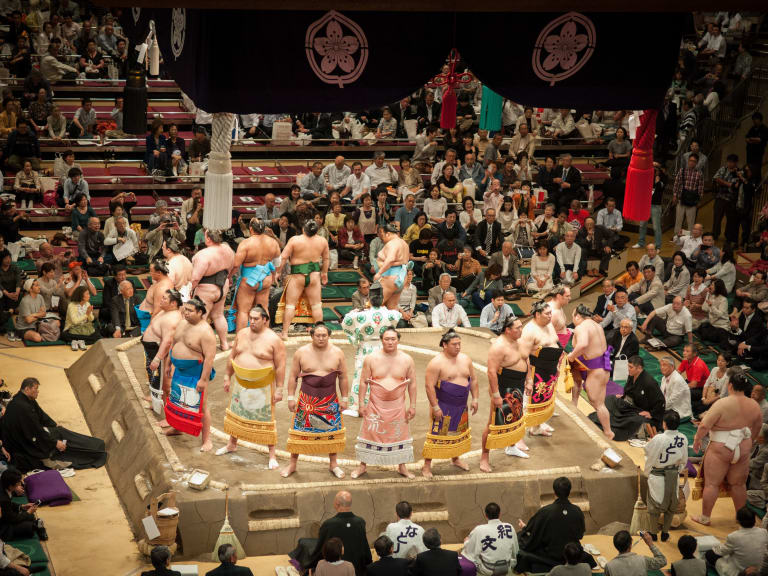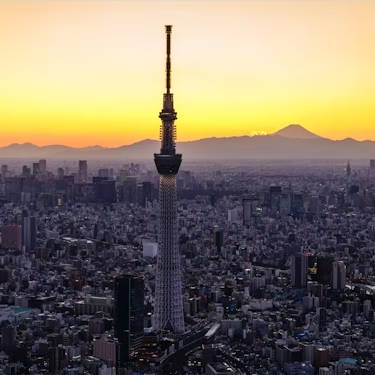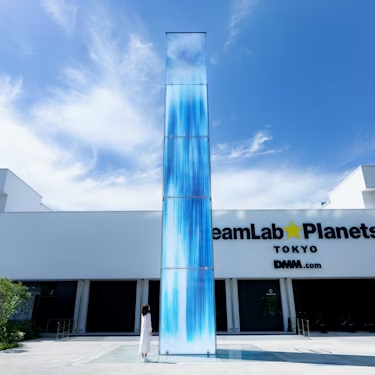More about: 10 Things to Do in Tokyo in Fall
Enjoy the eclectic city of Tokyo surrounded by beautiful views thanks to the reddish and yellow tones of autumn along with various seasonal activities and cuisine. Don't miss these 10 great things to do in autumn Tokyo.
There is truly a lot to see and do in Tokyo, so if you're planning to visit Japan's capital, autumn is one of the best seasons to do so. The city begins to bid farewell to the sweltering summer as the leaves of the maples and ginkgos take on their characteristic ochre colour. Join me on this tour of one of the world's most interesting cities.
1. Enjoy the Ginkgo Festival at Meiji Jingu Gaien Park

Visit the beautiful Meiji Jingu Gaien Park, located in the Shinjuku district of western Tokyo, near the Meiji Jingu Shrine.
The park is famous for its 300-metre avenue lined with Ginkgo trees, which turn their leaves a golden colour in autumn. This natural phenomenon is so precious in Japanese culture that it has its own name: Kōyō or momiji.
The Jingu Gaien Ginkgo festival is held in November and is a popular place to photograph the leaves and spend the day with the family, or simply sample Ginkgo-based dishes at the more than 300 stalls set up for the occasion. If you're still hungry for Japanese dishes, you can always take one of Tokyo's best food tours. Also, for the duration of the festival, the park remains open at night to enjoy the illuminated trees.
If you are interested in art, in the same park you can visit the Meiji Memorial Picture Gallery, built in 1925 and made up of paintings of life during this ancient period.
2. Enjoy the Chestnut Festival at Okunitama-jinja Shrine

Okunitama-jinja is one of the oldest shrines in the city, about 2000 years old, and is located in the city of Fuchū, west of Tokyo.
The Okunitama-Jinja Autumn Festival, also known as the Chestnut Festival, is held on 27 and 28 September and has been a highly valued food since ancient times due to its easy cultivation in the area. During these two days, the festival grounds are illuminated with almost 200 paper lanterns while you enjoy the traditional parade of floats and the Fuchū Noh theatre troupe.
Okunitama-Jinja Shrine can be reached by train. It is a 5-minute walk from the Keio Line and a 5-minute walk from Fuchu Honmachi Station on the JR Musashino Line of the Nambu Line.
3. Visit Rikugien Garden

Rikugien Garden is located in the Bunkyo district, north of Tokyo, and was designed by Yoshiyasu Yanagisawa in 1702. The design was based on scenes from famous poems of the time. It was later donated to the city of Tokyo and is now considered a special place of scenic beauty under the law for the protection of cultural property with high artistic and ornamental value.
Autumn is one of the best seasons to visit, as you can see the main pond surrounded by maples and keyakis in their characteristic seasonal colours or the panoramic view of the entire garden from the artificial hill. It is a popular destination at this time of year, which is why visiting Rikugien Garden is one of the top 10 things to see and do in Tokyo in November.
From mid-November to early December, the garden extends its opening hours through Momiji thanks to the night view of the illuminated trees until dusk. The trails are not very time-consuming, which is ideal if you are in the vicinity of Ueno Park or Nezu-Jinja Shrine or from Tokyo Station on the Yamanote line to Ueno to Komagome Station.
4. Enjoy Momiji on a day trip to Mt. Mitake

Mount Mitake, 929 metres high, is located 90 minutes from Tokyo. It is the second most popular mountain after Mount Takao for hiking and Momiji observation. You can reach the top by the Mitake Tozan Railway. The views along this route will give you a magical, fairytale-like experience.
At the top is the Musashi-Mitake Shrine. To reach the shrine you have to cross a small village of old houses and a small shopping area with restaurants and souvenir shops. Crossing the shrine you can access a path that leads to the Rock Garden. On this path there are also two waterfalls Nanayo no taki and Ayahiro no taki.
Another must-see is the Sawanoi Sake distillery, which is located very close to Mitakesan.
Access to Mount Mitake can be made from Shinjuku Station or Tokyo Station with the JR chuo line to Ome Station, then change to the Ome Line train to Mitake Station. There you should take the Nishi Tokyo Bus Company bus which will drop you off at the base of the Mount Mitake funicular.
5. Autumn colours and the kōyō festival at Showa Kinen Park

Showa Kinen Park was built in 1983 to commemorate the 50th birthday of Emperor Hirohito. It is located just 30 minutes from central Tokyo from Nishi-Tachikawa Station on the JR Ome Line.
It is ideal for cycling due to its 180 hectares of land. If you don't have your own bike, you can rent one at the various stands around the park for a small fee. Another option for renting is to go canoeing on the pond.
During the month of November, the park is one of the best places to see the colourful foliage of the trees at its peak. From the main gate entrance you will be greeted by a golden tunnel of Gingko and in the evening, the kōyō Festival is held where you can enjoy the illuminated trees. Unlike the cherry blossom festival, which is usually very brief, the kōyō Festival can extend over several weeks, even more than a month. You will be able to see the colours of autumn in full bloom.
There is also a picnic and barbecue area, but if you prefer to buy your food there, you can do so at local stalls and restaurants.
6. Visit Mount Takao and the surrounding area

Mount Takao is about 599 metres high and is a good choice if you want to take a break from the city without going too far. It is located in Hachioji City, west of central Tokyo. You can take the Semi Limited Express train on the private Keio line from Shinjuku Station to Takaosanguchi Station. You can also see more JR Pass offers or simply take one of the Tokyo Bullet Train tours.
If you enjoy hiking, the mountain has several trails of varying levels of difficulty for the ascent. If you prefer not to walk, however, you can reach the top via a funicular or cable car, which is located 5 minutes from Takaosanguchi Station. You may feel watched at times, but don't worry, it's probably just a Tengu watching you.
Mount Takao is very popular during autumn for the Kōyō or Momiji, where you can enjoy the beautiful colours of the foliage. From the cable car you can enjoy the view of Tokyo and you can even see Mount Fuji if the weather permits. It is definitely one of the best places for photography. And if photography is your thing, you should not miss one of the best photo tours in Tokyo.
As for food, there are some local restaurants and teahouses around the Mount as well as at the top. You can also enjoy the Takaosan-Onsen at its base.
7. Halloween and the red carpet of cinema together in Roppongi!

If you're a film buff you can't miss the Tokyo International Film Festival. This event takes place every year during the months of October and November. At the festival you can enjoy open-air screenings of films of various international and national genres at different locations in Roppongi Hills. In addition to the screenings, there are various exhibitions and talks about the seventh art.
Although Halloween is not a Japanese holiday, it has become very popular in recent years and has slowly adapted to every audience. At the end of October, the Roppongi Hills Halloween is organised where more than 2000 children participate in costumes, while adults have their chance at night with parades and festivities in the streets, bars and nightclubs.
Roppongi Hills can be reached from Shibuya and Shinjuku. From Shibuya take the Yamanote line to Ebisu station and from Shinjuku take the Oedo underground line. If you are travelling from Tokyo Station, take the Marunouchi Line to Kasumigaseki and combine with the Hibiya Line to Roppongi.
8. Luck and prosperity in business: Tori no Ichi festival in Asakuza

If you're passing through Tokyo in autumn, you can't miss the Tori no Ichi festival. This traditional celebration is held in November at temples and shrines that are related to the day of the rooster and is intended to pray for business success. The most important one is held at Otori Temple in Asakusa.
During the three days of the festival you can see and buy Kumades, finely decorated rake-shaped amulets that are a symbol of prosperity and good luck. Here you can also enjoy typical food stalls and dance performances, especially the Otori Mai, which has been performed to ward off evil spirits since the Edo period.
Asakusa Temple can be reached on the Hibiya line of the Tokyo Metro.
9. Witness a traditional sumo wrestling match in Tokyo

Would you like to watch a sumo match? Sumo is Japan's national sport, currently there are 6 national tournaments a year, one of them is the Aki Basho Tournament, which is held in September at the Ryogoku Kokugikan sumo stadium in Ryogoku, just 13 minutes from Tokyo Station.
The Ryogoku Kokugikan stadium can be visited even on non-tournament days, which is ideal for photo opportunities. If you want to see a live bout, it is recommended that you book tickets in advance at authorised stalls or on the Nihon Sumo kyokai website.
Near the stadium is the Sumo Museum where you can explore the history of this historic sport. And if we are talking about history, Ryogoku is home to the Edo-Tokyo Museum with its models depicting the life of Tokyo from its beginnings to the present day. Also, if you return via Ryogoku Station, don't forget to visit the Ryogoku Edo Noren, an old Edo street with period restaurants and a sumo ring.
10. Enjoy the Todoroki Valley just 20 minutes from Tokyo

Take a stroll through one of Japan's most naturally charming places. Todoroki Valley is located in the city of Setagaya, southwest of Tokyo. It is the only valley entirely designed by nature itself and not by man, as is the case with the gardens and parks found in the city.
The valley can be walked along the towpath along the Yazawa River, a tributary of the Tamagawa. Along its 1.2 km you can enjoy the bamboo forest, small waterfalls and the amazing autumn colours of the vegetation. If you are interested in the history of the region, there are archaeological excavations of very old tombs in the form of tunnels, probably belonging to the Kofun or Nara period, for this discovery the valley was declared a place of historical interest.
Visiting this place in autumn has the extra attraction of the wonderful spectacle of its hues, here you can definitely enjoy the Momiji in all its splendour. If you still have some time left you can visit Gotokuji Temple. This temple is famous for its lucky maneki-neko cats. It is said that the temple of the lucky cat legend is Gotokuji. The shrine has several halls, some with figures of these cute little cats.
From Todoroki Valley to Gokuji Temple you can take the Setagaya Line tram. The journey takes no more than 20 minutes and you can take the opportunity to see some of the neighbourhood's sights.




